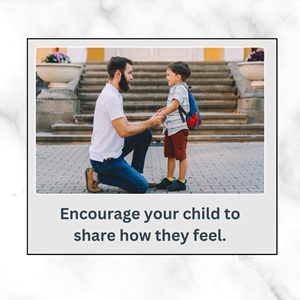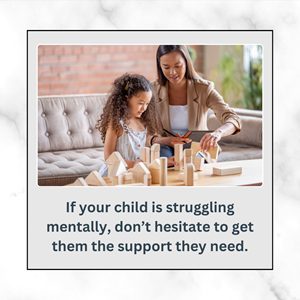 As a parent, your child’s wellbeing is hands down your number one priority. You’ve bandaged cuts and attended to bruises with loving care, doing your best to comfort your child—all the while wishing there was more you could do.
As a parent, your child’s wellbeing is hands down your number one priority. You’ve bandaged cuts and attended to bruises with loving care, doing your best to comfort your child—all the while wishing there was more you could do.
And when you see your child struggle with mental discomfort like depression and anxiety, you’re at a loss.
At least with physical pain you can see what’s wrong. You can grab the first aid kit and fix it. Attending to your children’s mental health can be a little trickier.
Before we get into some of the things you can do to help support your child’s mental health, it needs to be said: If you have any reason to believe your child is struggling mentally, do not delay getting them into treatment, ASAP.
Talk to their pediatrician, and find them a therapist. If you’re a Northern California resident, give us a call—we can help. Many of the ways people learn to cope—both good and bad—get established in childhood, and therapy helps ensure your child learns healthy ways to navigate life.
Now that that’s been established, let’s look at some of the things you can do to help take care of your child’s mental health.
Communicate Regularly
Usually communication (or lack thereof) is a good indicator of how someone is feeling. Establish a relationship with your child where you communicate regularly about all sorts of age-appropriate things.
A wonderful way to make communication a habit is to take regular walks with your child. There are multiple studies showing how getting out for a walk enhances communication and of course there are countless other benefits associated with getting outdoors and moving.
Talk About Feelings
When you’re young—ok when you’re any age really—feelings and emotions can easily overpower you. It’s hard to see past them or put them into perspective.
Unfortunately, there’s no way to protect your child from ever feeling pain. Pain is part of the human experience, and its existence helps make the good parts of life incredible, because we have something to measure them against.
 Encourage your child to share how they feel. Let them know it’s okay to be sad from time to time. Let them know that anger too, is a normal human response and it’s more about finding healthy ways to express the anger instead of lashing out. If your child is old enough, encourage them to explore what’s underneath the anger: Is it fear? Shame? A sense of betrayal?
Encourage your child to share how they feel. Let them know it’s okay to be sad from time to time. Let them know that anger too, is a normal human response and it’s more about finding healthy ways to express the anger instead of lashing out. If your child is old enough, encourage them to explore what’s underneath the anger: Is it fear? Shame? A sense of betrayal?
Above all, let them know that emotions are transient. Like clouds passing overhead, they change. The sun always returns.
Check in With Them
Make an effort to check in with your child regularly. Ask them how school is, how things are going with their friends. Ask them open- ended questions so they can expand upon vs yes or no questions.
If there’s something they’re finding particularly challenging or difficult, encourage them to talk about it, and be as supportive as you can.
Monitor Screen Time
There are so many different types of screens these days that drain attention, and the consensus with all of them is that if you overindulge, it can wreak havoc on your mental health.
Children especially are vulnerable. As the brain develops, it’s crucial they have the skills to exist in the “real world,” and not become reliant and hyper fixated on video games, social media, and the myriad of other lures that draw people to screens. As stated by the NIH,
“Excessive screen usage can also lead to problems in social-emotional development, including obesity, sleep disturbances, depression, and anxiety. It can impair emotional comprehension, promote aggressive behavior, and hinder social and emotional competence.”
Encourage Them to be Creative
Giving your child the opportunity to express themselves creatively is an excellent way for them to develop self-esteem and feelings of accomplishment. It allows them to bring something within them to life, and share it with the world. From writing to baking to acting or playing music. Let your child be creative for the sheer joy of it. This is shown to help reduce stress and anxiety in not just kids, but people of all ages.
Educate Them About Stress
Kids usually don’t have a frame of reference for the feelings and emotions they experience. They don’t inherently know that sadness usually gives way to light, and happiness returns.
They probably won’t even recognize stress as stress when they initially begin to feel it.
Therefore, by discussing what stress feels like, the types of situations that commonly lead to feeling it, what’s happening in the body during moments of stress, and why the stress response exists in the first place, is all important to share.
Equally important is teaching your child what they can do to alleviate the stress response. Encourage them to get outdoors, shoot some hoops or go for a walk.
This is another great aspect of therapy: Therapists educate their young clients in an age-appropriate manner about what’s happening in the brain and body during moments of anxiety and stress, and equip them with the tools and resources to help.
Don’t Put Too Much Pressure on Them
There’s so much pressure to achieve status, to constantly push yourself to be “better.” Teenagers are hit with it full-force as everyone asks (and judges) what they want to be when they grow up.
Obviously, there’s nothing wrong with having goals and dreams. It’s important for kids and teens to learn how to handle responsibilities.
The tricky part here is to separate core identity from achievement. Many times, people unconsciously believe that in order to be “worthy,” they have to achieve something. This sends people off on unfulfilling career paths, or has them constantly seeking external validation.
Of course, this doesn’t mean not celebrating when your child does well, it’s more about showing them that love is unconditional, and they don’t have to be a mid six-figure earner in order for you—or anyone else—to love them.
Again, if your child is struggling mentally, don’t hesitate to get them the support they need.
At the Relationship Therapy Center, we work with people of all ages, and love nothing more than helping young people cultivate the tools and insight for a happy healthy future.
Begin Play Therapy or Child Counseling in Roseville or Fair Oaks, CA Today!
 If your child is struggling one of the best things you can do is be proactive in getting your child help from a trained play therapist. With help and support you child can overcome the things that are troubling them and move forward in their life with more confidence and peace. Our counseling practice offers specialized play therapy and child counseling services by certified play therapists at both of our locations. Your child, and your family, can get to a better place. Our child therapists are here to help.
If your child is struggling one of the best things you can do is be proactive in getting your child help from a trained play therapist. With help and support you child can overcome the things that are troubling them and move forward in their life with more confidence and peace. Our counseling practice offers specialized play therapy and child counseling services by certified play therapists at both of our locations. Your child, and your family, can get to a better place. Our child therapists are here to help.
To begin counseling in Fair Oaks, CA, Roseville, CA or online, follow these steps
- Contact the Relationship Therapy Center and schedule a free 15-minute phone consultation to learn more about in-person or online child therapy.
- Make an appointment for your teen to meet with one of our compassionate child therapists.
- Get the support your teen needs to navigate adolescent challenges with confidence!
Other Services offered at The Relationship Therapy Center in California:
In addition to teen therapy, Our Sacramento area counseling clinics located in Roseville and Fair Oaks, CA are pleased to offer a variety of mental health services. Our couples services include: Counseling after infidelity, sex therapy, co-parent counseling, family therapy, divorce counseling, intensive couples retreats, and premarital counseling. Our individual therapy services include, therapy for children, teen therapy, depression treatment, and individual relationship counseling. Our therapists offer online counseling in California to treat a variety of mental health concerns. Please reach out to our Sacramento area therapy office to learn more about the many ways we can help you or your loved ones heal and grow.
